


Framed or unframed, desk size to sofa size, printed by us in Arizona and Alabama since 2007. Explore now.
Shorpy is funded by you. Patreon contributors get an ad-free experience.
Learn more.

- Roll your own
- Rugged and real!
- A Charles Purcell - Mama Cass Connection
- Uncle SAAM
- Obfuscation
- One Chocolate Soldier rode away
- Victor Marquis de la Roche
- The Little House Across Way ...
- Vanderbilt Gates
- Vanderbilt Mansion
- You can still see that gate
- Withering heights for me
- So Jim,
- Top Heavy
- Re: Can't Place It.
- Bus ID
- Since you mention it
- The White Pages ?
- Moonlight Tower
- 1907?
- Fire(men) and Water
- Can't Place It
- Can anyone
- Wings
- Where's Claudette and Clark?
- Overbuilt Rolodex
- One song
- Give Me Wings Please!
- PRR
- Pinball Wizards
Printporium
Fairview Hotel: 1916
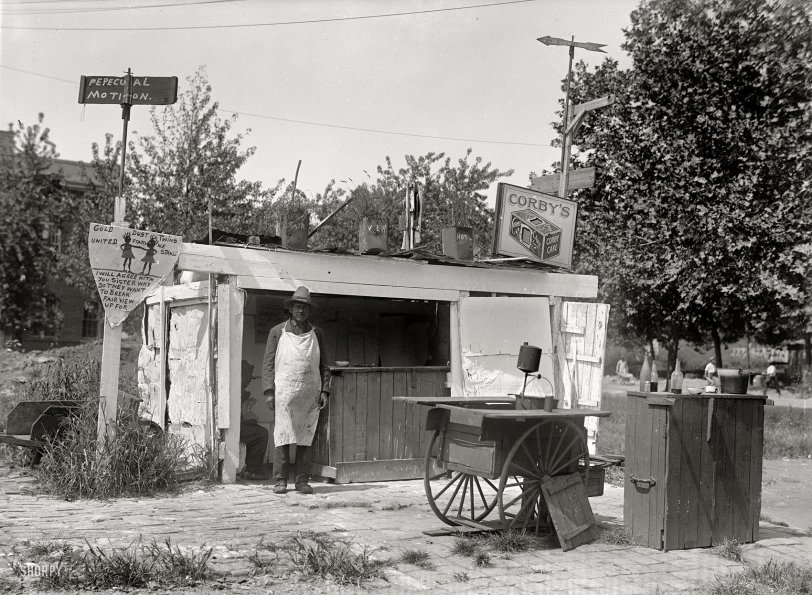
Washington circa 1916. "Fairview Hotel, 1st Street and Florida Avenue." The proprietor is former slave and "colored philosopher" Keith Sutherland. See the comments below for more on him. Harris & Ewing glass negative. View full size.
"Arbiter of all Brawls"
"Keitt" Sutherland was getting towards the end of a colorful life here.
Washington Post, February 4, 1900.
EX-KING OF THE BOTTOM
Once Dominated a Notorious Section of the City.
WHERE CRIME AND EVIL REIGNED.
Reminiscences of "Hell's Bottom," Which Formally Kept the Police Department Busy, Recalled by "Keitt" Sutherland, the Odd Character Who Figured as Self-appointed Arbiter of all Brawls –- His Curious Resort in Center of that Section.
KEITT'S.
I, am, going,
to, put, my,
name, above,
THE DOOR.The above legend with its superfluity of commas, inscribed on a piece of board about a foot square, nailed above the door of a tumble-down building at the intersection of Vermont avenue, Twelfth and R streets, marks the abode of the “King of Hell’s Bottom.” The structure thus adorned is the pool room of “Keitt” Sutherland, overlord and supreme ruler of the negroes in the
vicinity. Although the encroachments of modern dwellings, increase in the police force, and other accompaniments of growing metropolitan life have somewhat shorn him of his feudal rights and curtailed his former realm, “Keitt” is now, and always will be, monarch of all he chooses to survey.It is still within the memory of the present generation when “Hell’s Bottom” was a fact and not a memory. The swampy, low-lying ground bred mosquitoes, malaria, and – thugs. It was the quarter set apart for and dominated by the tough element of the colored population. A white man with money in his pocket studiously avoided the locality after dark, or else set a fast pace to which he adjusted the accompaniment of a rag-time whistle. Half a dozen saloons congested within the radius of a block served the barroom habitués with whisky as hot as chile con carne and as exhilarating as Chinese pundu. Fights arose approaching the dimensions of a riot, and the guardians of the law had all they could do to quell the disturbances. A policeman or two was killed, and that, together with the growth of the city, led to the rehabilitation of “Hell’s Bottom.” Now it is interesting mainly in its wealth of reminiscence.
“How did I happen to put up that sign?” Keitt repeats after the inevitable query. “I’ll tell you. You see my folks used to own that property, and they was sort o’ slow dyin’ off. I knowed I was going to come into it some day, an’ I thought I might as well let people know it. About that time a show came along, and they sang a song somethin’ like this: “I am going to put my name above the door. For it’s better late than never. An’ I’ll do so howsomever.’ It gave me an idea. I just put that sign above the door. After while the folks died, an’ I got the property.”
Queer Sort of Place.
Guided by the much-be-commaed signboard, the visitor goes to the door of the poolroom and inquires for “Keitt.” He finds the room filled with colored youth of all sizes, the adults of which are engaged in playing pool at 5 cents a game. The balls on the table are a joblot, the survivors of the fittest in many a hard-fought game. The cushions are about as responsive as brickbats. But the players do not seem to care for that so long as they can drive the balls into the pockets and make their opponents pay for the sport. An ancient, dingy card on the wall informs the reader that he is within the precincts of the “Northern Light Poolroom.” The same placard also gives the following warning: “Persons are cautioned against laying around this building.”
“Where is Keitt?” inquires the intruder, who finds himself regarded with suspicion.
“Two doahs down below. Jest hollah ‘Katy,’ an’ he’ll show up,” is the answer.
“Keitt” on inspection justified the right to the title of “king.” He is a giant, weighing 250 pounds, well distributed over a broad frame six feet and one inch in height. He looks like a man who would not shun a rough and tumble fight. He does not have to. A registered striking machine off in the corner shows that he can deliver a 500-pound blow. He might do better, but unfortunately the makers of the instrument did not figure that a man’s fist was a pile driver, and 500 pounds is as high as the machine will register. Many are the tables told of his prowess; of how he whipped in single combat the slugger of the community, a man who had challenged any five to come on at once; of how when only a bootblack in the ‘60’s, he sent three bullies about their business with broken heads and black eyes; of how he used to suppress incipient riots in his saloon by means of his strong arm and without the aid of the bluecoats in the neighborhood. Indeed, the police used to say that “Keitt” was as good as a sergeant and a squad with loaded “billies.”
But “Keitt” (the name is a popular conversion of the more familiar “Keith”) has not won his way entirely through the medium of brawn. He is a man of intelligence, and has a keen eye for business. He is the magnate of the neighborhood, with property in his name, money in the bank, and a good comfortable roll about his place of business. He can go down in his pocket and bring out more $50 bills than the average man caries about in the $5 denomination. If one hints robbery or burglary “Keitt” simply rolls his eye expressively, and enough has been said. No one cares to tamper with his till.
Plenty of Local Color.
The saloon on the outside looks like a combination coal and wood shed. “Keitt” apologetically explains that it was formerly a stable, and that he has not had time to fix up much. Nevertheless, the fish, beans, sandwiches, and other eatables are so tempting that the frequenters of the place do not pay much attention to external appearances. The magic of the proprietor’s name draws as much custom as he can attend to, and fully as much as the customers can pay for. There is a charm about the old haunt that cannot be dispelled by police regulations or the proximity of modern dwellings.
On Saturday night the place takes on something of its old glory. In the smoke-begrimed room – hardly 12 by 12 – are found thirty or forty men eating and talking. Through the thick clouds of smoke the lamps throw out a dim gleam, and the odor of frying fish and the fumes of the pipe struggle for the mastery. The crowd gets noisy at times, but any attempt at boisterousness is quieted by a word from the dominant spirit of the gathering. If any one gets obstreperous he is thrown out on the pavement, and it makes little difference to the bouncer whether the mutinous one lands on his head or not. This is the negro Bohemia. They who live from hand to mouth love to come her. The boot-black with a dime receives as much consideration as the belated teamster with a roll of one-dollar bills.
Business is business, and “Keitt” is a business man. Consequently there is very little credit given. “Five or ten cents is about the limit,” says the autocrat. But “Keitt” is something of a philanthropist., although he makes his charity redound to his personal benefit. An illustrated placard, done in what appears to be an excellent quality of shoe blacking, has the figure of a man sawing wood. It bears the following words, “Just tell them that you saw me sawing wood at Keitt’s for a grind.” The term “grind” is synonymous with mastication, the wood sawyer thereby being supposed to do a stunt for the recompense of a square meal. This does away with the tearful plaint that is ever the specialty of the hungry and penniless, gives employment to the idle, and increases the size of “Keitt’s” wood pile. The latter is sold to the negroes of the neighborhood at prevailing prices. “Keitt” figures that his method is wiser than giving unlimited credit, and he is probably right.
“Keitt” is a mine of reminiscence. He has been in Washington 1862, when he came from Charles County, Md., where he was born a slave. He was a bootblack around the Treasury building, and he remembers seeing Lincoln’s funeral pass by, with the white horse tied behind the hearse. His history of the rise and fall of “Hell’s Bottom” is quite valuable from a local standpoint. Divested of dialect, it is as follows
“’Hell’s Bottom’ began to get its name shortly after the close of the war in 1866. There were two very lively places in those days. One was a triangular square at Rhode Island avenue and Eleventh street. It was here that an eloquent colored preacher, who went by the name of ‘John the Baptist,’ used to hold revival services, which were attended by the newly-freed slaves. The revival was all right, but the four or five barrooms in the neighborhood used to hold the overflow meetings, and when the crowds went home at night you couldn’t tell whether they were shouting from religion or whisky.
“Then there was what was known as the ‘contraband camp,’ located on S street, between Twelfth and Thirteenth. The negroes who had just been freed stayed there waiting for white people to come and hire them. They got into all sorts of trouble, and many of them settled in the neighborhood. Money was scarce and whisky was cheap – a certain sort of whisky – and the combination resulted in giving the place the name which it held for so many years. The police force was small. There was no police court, and the magistrates before whom offenders were brought rarely fixed the penalty at more than $2. Crime and lawlessness grew terribly, and a man had to fight, whenever he went into the ‘Bottom.’
“The unsettled condition of the locality made things worse. Men used to shoot reed birds where Corcoran street now is. I have caught many a mud turtle there in the 60’s. I saw a man get drowned in the creek at Seventh and R streets. At the point where the engine-house is now located on R street a man could catch all the minnows he wanted for bait. Tall swamp grass afforded easy concealment for any one who wanted to hide after a petty theft or the robbery of some pedestrian. Consequently, it is small wonder that the law was defied in those days.
Many Disorderly Rowdies.
“A white man never wanted to cross the ‘Bottom’ after dark. If he did he had to keep stepping. Just how many crimes of magnitude were committed there no one can tell. The life of the negro was far from easy. If a fellow took a girl to church, the chances were that he would not take her home. A gang of rowdies would meet him at the church door as he came out. They would tell him to ‘trot,’ and he seldom disobeyed. They escorted the girl themselves. It was impossible to stop this sort of petty misdeeds.
“At times the trouble grew serious. I have seen 500 negroes engaged in a fight all at once in ‘Hell’s Bottom.’ That was during the mayoralty elections, and the riot would be started by the discovery of a negro who was voting the Democratic ticket. I have had big fights in my old saloon, but there was only one that I could not stop with the assistance of two bouncers I had in those days. There were fully fifty men in the saloon at the time, and most of them were drunk. They began to quarrel, and when I could not stop them I blew a distress call. About fifteen policemen came, for in those days it was useless to send two or three to quell a disturbance around here. When word came that the police were after them the last man of them rushed through the rear part of the saloon, and I’ll give you my word that they broke down the fences in five back yards in getting away. Not a man of them was captured.
“Ah, those were the days. Things are quiet around here now, but sometimes we have a little fun, and then the boys go to the farm for ninety days. I keep ‘em pretty straight in my place, though, let me tell you.”
Corby Bakery
It later became a Wonder Bread bakery (last time I was by there, the old "Wonder Bread" sign was still in place). The Corby buildings are still there (east side of Georgia just north of Bryant Street) and now house a strip of retail shops and fast food places.
Just like India of today
Here in India, we still have thousands of "hotels" just like this one. I can walk to the end of the street here and find three of them that in black-and-white wouldn't look so different.
Many are even on wheels (carts with bicycle wheels). Most have similar folk-art signs complete with misspellings. And similar records of cleanliness.
I always thought it was interesting that restaurants in India are still called hotels. Now I see it's not odd, just archaic.
Sutherland Family
1880 Census
1643 Vermont Avenue
Sandy Sutherland, 54
Rach Sutherland, 57, (wife)
Webster Sutherland, 12, (son)
Keith Sutherland, 25, (son)
Hattey Sutherland, 22, (daughter-in-law)
Mary Sutherland, 6, (daughter)
Willie Sutherland, 4, (son)1900 Census
1112 R St
Keith Sutherland, 46
Hattie Sutherland, 44, (wife)
Arthur Sutherland, 3, (son - adopted)
Webster Sutherland, 32, (brother)1920 Census
104 Seaton Place Northeast
Keith S Sutherland, 65
Hattie D Sutherland, 64, (wife)
Webster Sutherland, 52, (brother)
???, 14, (daughter)
Arthur L., 21, (son)
Cora, 15, (daughter-in-law)
Pinkey ???, 52, (mother-in-law)
Into the Future
The descendants of Keith Sutherland's little counter 100 years ago were still going strong when I moved to Washington in the 1980s. I was directed by my new colleagues to explore the alleyways around our offices at M Street and Connecticut Avenue for (legal) hole-in-the-wall eateries for lunch and breakfast. It didn't take long for these places to become favorites of mine. I've been gone from D.C. for 20 years now; I'm wondering if these establishment still exist.
Alley Cook-Shops
Washington Post, Jan. 1, 1897.
LICENSES FOR ALLEY COOK SHOPS.
Judge Kimball Decides They Are Liable
To a Fee of $25 a Year.The alleys of this city are filled with colored cook-shops, which heretofore have paid no license fee. Judge Kimball said yesterday, however, that every one of them must pay $25 a year. Only the police and the people who visit the numerous alleys and little streets of the city know how many of these cook-shops exist. The colored people generally resort to these places for pigs' feet, meat pie, and substantial provender prepared by the old mammies and quaint old colored men who run them, and cook dishes to the taste of the people of their race.
The police yesterday brought into court, as a test case, Keith Sutherland, who has conducted a cook-shop for many years at 1111 R street. He was released on bonds after he took out a license, and as the matter has now been tested the police will bring all the proprietors of unlicensed cook-shops to the Police Court.
Sage Dies
Washington Post, Feb. 21, 1933.
Sage Dies
Former Slave Prophesied
Voters' Landslide for Roosevelt.Keith Sutherland, colored philosopher and prophet whose political forecast won him the thanks of President-elect Roosevelt, fulfilled his final prediction Sunday when he folded his hands about a Bible and died at his home, 1640 Eleventh street.
The former slave felt the approach of death Friday, his children said. He called his family together and instructed them to prepare a funeral, saying that he would die on the Sabbath.
Last August Sutherland dreamed of a great voters' landslide for Franklin D. Roosevelt. The dream was so "clear" that he wrote Mr. Roosevelt a description of it. Mr. Roosevelt responded with a "thank you" note saying he found the prediction "very encouraging."
For the past half century Sutherland has kept a restaurant in Washington where the walls were posted with his prophecies, many of them showing unusual foresight.
He was 79 years old. Funeral services will be held tomorrow at 1 p.m. at the P.A. Lomax funeral home, Fourteenth and S streets. Interment will be at Harmony Cemetery. He is survived by four children.
Gold Dust Twins
Fred Lynn and Jim Rice were known as the Gold Dust Twins in 1975. I figured the name came from somewhere, but I didn't know it was from washing powder.
Hostelry Spared
Local News Briefs
Upon recommendation of both the health officer, William C. Woodward, and Building Inspector Hacker, the District commissioners decided not to condemn "Fairview," the famous hostelry at First street and Florida avenue northwest , owned by Keith Sutherland, colored philosopher. About a month ago complaints reached the health office that "Fairview" was insanitary and a menace to the health of the city. The commissioners decided to investigate, but before they were ready to take action, an eight-foot petition signed by hundreds of residents of the northeast section, asking that "Fairview" be allowed to remain, was presented to them by Sutherland.
Washington Post, Sep 9, 1916
District Building Notes
Keith Sutherland, the aged colored proprietor of the Fairview Hotel, at First street and Florida avenue northwest, impressed city authorities so much last week with a plea for the retention of his property, which had almost been condemned to be razed, that it is likely the "hostelry" will be allowed to stand. Sutherland hobbled to the District building and presented a petition for his place signed by about 200 neighbors. Health Officer Woodward investigated the property and it is understood reported favorably on letting it remain. The building inspector, Morris Hacker, has the matter now under consideration. Sutherland is famous throughout his section of the city for his bits of philosophy, with which the walls of his establishment are painted.
Washington Post, Sep 10, 1916
The Real McCoy
It actually looks like Grandpappy Amos McCoy's apple cider stand.
Those signs
Keith Sutherland's quaint signs would qualify today as genuine folk art.
Roof Garden
For me a most entertaining aspect of the photo is the three rusty tins being used as planters on top of the shack: FAIR VIEW HOTEL
And the whiskey bottles on the stand tell a lot about this place.
Corby - Washington's Biggest Bakery
Article from October 1915 issue of Bakers Review courtesy of Google Books:
The largest bakery in Washington--and model one, too, in every sense of the word--is that owned and operated by the Corby Baking Co., one of the most progressive baking concerns in the United States.
The firm was organized twenty years ago, when they started a little bakery down town. In 1902 they bought out a baker at 2305 Georgia Ave., (where their present plant is situated), and then built the first addition. In 1912 they built again, giving the Plant of the Corby Baking Co., Washington, D. C. building its present size.
The article even has pictures!
Soup to Go
Take a good look at the wooden cart. It has a kerosene container with a tap. It looks like it goes under the "soup" pot. Maybe Mr. Sutherland took his cart around and sold food as a vendor. He has a counter on both sides! Amazing.
Gold Dust Twins
"Fairbank's Gold Dust Washing Powder - The Many Purpose Cleaner. Gold Dust products were represented by the Gold Dust Twins, two African-American children surrounded by gold coins. The orange box with the universally recognized twins practically jumped off the shelf. In fact the twins were one of the best known trademarks of the 19th century. Let the Twins Do Your Work was the tag line. The back of the box shows the twins tackling several household chores as well as a list of 34 cleaning jobs made easier by using Gold Dust.
http://www.the-forum.com/advert/golddust.htm
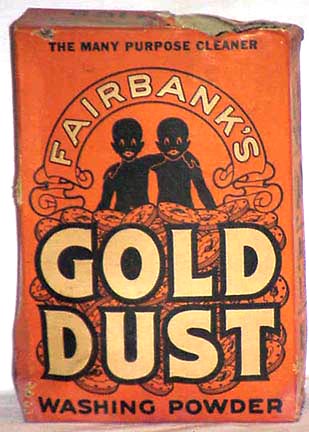
This Quaint Structure
Washington Post, September 3, 1916.
PLEAD FOR QUAINT HOTEL
Hundred Neighbors Sign a Petition
To Save Sutherland's "Fairview."A petition eight feet long, signed by about 100 neighbors of the Fairview Hotel, First street and Florida avenue northeast, will be introduced as evidence against the condemnation and closing of this quaint structure when a hearing is held at the District building Tuesday to determine whether the property shall be razed for sanitary reasons. Keith Sutherland is the aged colored proprietor, and he hobbled to the District building last week and appealed to Daniel Donovan, secretary to the board of commissioners, to save his place.
Since filing his appeal the health department has investigated the property. Its report has been turned over to Commissioner Brownlow, and will be heard at the hearing.
Fairview is a one-room hotel, opposite the Baltimore and Ohio freight yards. On the spotless whitewashed walls the proprietor, Sutherland, has written some quaint bits of philosophy for the edification of his customers -- truck drivers and employes about the yards.
Wow!
Now this is one of the most interesting photos posted on Shorpy in a long time. I would love to know the story behind the "I will agree with you sister..." sign.
Fair View?
Why, I'd say it was better than fair. It's downright byootyfull.
Gold Dust Twins
"I will agree with you sister why do they want to break up Fairview for"
Cryptic sign. One might assume the city wanted to tear down the, um, stately Fairview Hotel. I can't imagine this was seriously a room for rent, unless it's just the check-in. Looks more like a ramshackle lunch stand.
Say!
I think I stayed there one year Thursday night!
I don't know why...
...but I have sudden craving for a delicious CORBY CAKE™.
Room comes with outside bar.
I wonder if he ever tried to patent his Pepecual Motion machine?





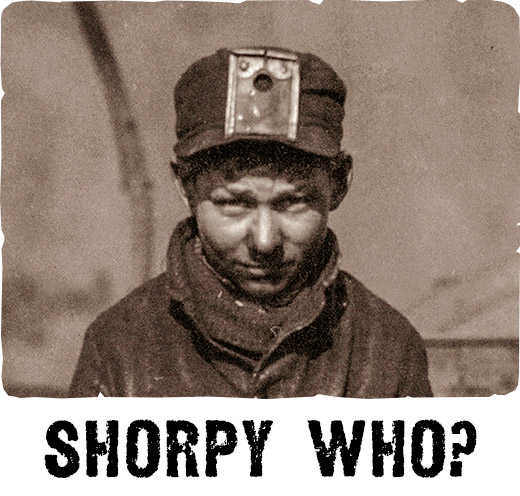
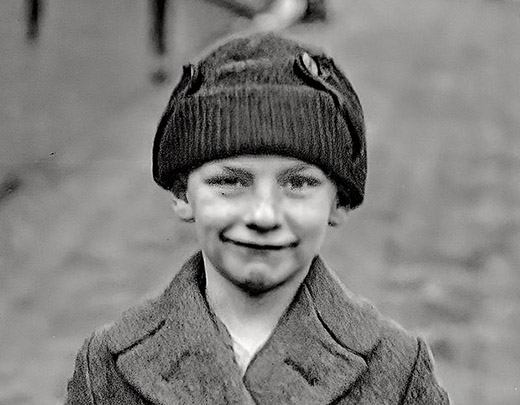
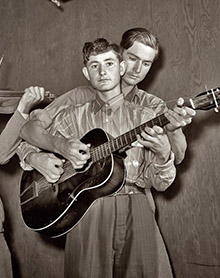
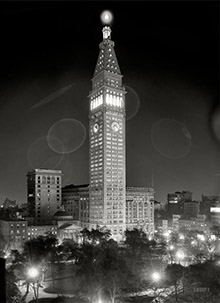
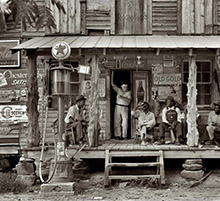
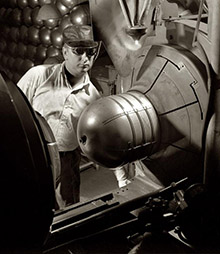
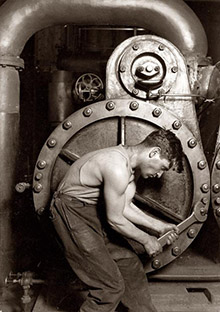

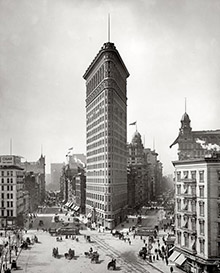



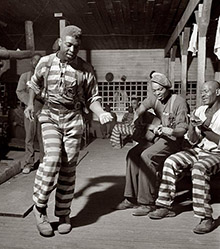
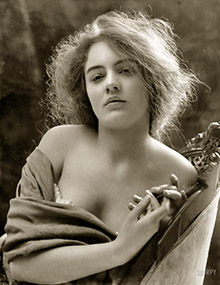
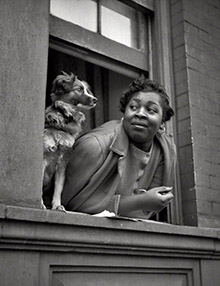

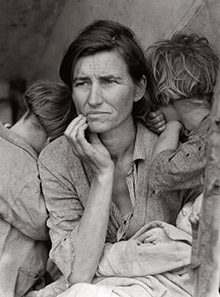

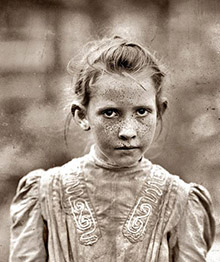
On Shorpy:
Today’s Top 5